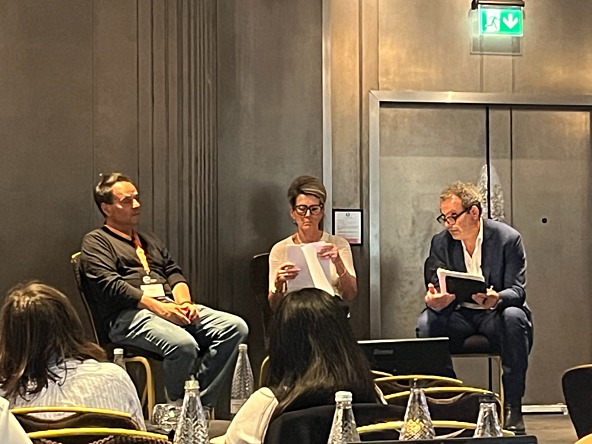More focus needed on storytelling, conference hears

Speaking on a panel session at the summit last week in London, Salama said that there could be a reluctance to use storytelling within research due to its difficulty, but said it was important to “think about the emotional reaction you want to generate as opposed to just the rational”.
He added: “What is the reason why clients spend all this money on research and insight? Ultimately it is because they want to do something differently. The work is designed to change the behaviour of someone.
“There has to be emotion in changing people’s behaviour. It is a hard thing to change behaviour – you’re only going to do it if there’s some kind of emotional oomph to it.”
Salama said that research budgets had been cut over time compared with other marketing budgets, and said that he felt that there was too little focus on how insight could create impact.
“I think the reason for [budget cuts to research] is that senior management don’t feel that research has a big enough impact on what they are doing and doesn’t drive revenue and growth as much as it ought to,” he explained.
“I think part of that is because of the way we as an industry approach things, that we’re not telling stories, we’re not talking about the opportunities, we’re not coming with ‘this is something you can do’.”
This meant being more subjective about data. “Have a point of view,” Salama added. “I could take any table or deck and tell a different story based on the same data. There is nothing objective about data – you can tell the story you want to tell.
“You’re not a neutral reporter of something as if it’s objective – everything is subjective. You have to have a point of view of what’s the story you want to tell here, and use the data to tell the story.”
This could also include qualitative data, Salama said. “When we talk about data, let’s not just think we’re talking about quantitative data. Qual has got a huge role to play in storytelling, having impact and generating impact.”
Also speaking on the panel, Beth Butterwick, chief executive at Clarendon Fine Art and former chief executive at Jigsaw Fashion, said storytelling was particularly useful in boardrooms.
“We are all grappling with so much data, especially in boardrooms, where you need one version of the truth,” she said.
“If you can illustrate incredible data with examples by storytelling, that is much more powerful than just looking at some spreadsheets and data.”
Butterwick said there needed to be a drive to connect with business leaders on an emotional level instead of purely rational. “We have grown up on data in businesses thinking that data is impressive, data is what wins pitches. But in actual fact we are humans,” she explained.
“If you look at all of the top brands, they are all good at stories. There are loads of evidence and data to measure it, but [brands] stick to their own simple stories. I think people don’t use [storytelling] enough because they’re worried that’s not what boards, businesses or clients want. I think we need to back up storytelling with data.”
Before acting, brands need to consider what they want to get across, Butterwick said. “What do we want the customer to feel? What emotion to we want to evoke? What is the call to action?”
Boards too readily “go straight into data”, she added, and don’t talk about impact and communication, saying that “not enough companies think about the client first – put your customer first and think about how to get that story across powerfully”.

We hope you enjoyed this article.
Research Live is published by MRS.
The Market Research Society (MRS) exists to promote and protect the research sector, showcasing how research delivers impact for businesses and government.
Members of MRS enjoy many benefits including tailoured policy guidance, discounts on training and conferences, and access to member-only content.
For example, there's an archive of winning case studies from over a decade of MRS Awards.
Find out more about the benefits of joining MRS here.














3 Comments
Roger Gane
8 months ago | 1 like
I was bemused by Eric Salama’s view at the MRS Storytelling Summit that “there is nothing objective about data” and that “you can tell the story you want to tell.” And then I was amused by his clarification on LinkedIn that of course this does not apply to data produced by Verian, the company he chairs, and which undertakes a great deal of work for the government! Data is just that, data. Objectivity, or the lack of it is not relevant. I think the issue here is the concern market researchers have had, over many decades, about the role research plays in the wider business world, and the constraint we feel because we are limited in what we can say whilst (in quant research at least) being be faithful to the numbers. I understand that frustration, which is also evident in the desire, again over the decades, to find a better term for what we do than ‘market research’. A good researcher can find stories to tell in sets of data, and use her/his skill in presenting them. What s/he cannot do is tell any story they fancy, which is not supported by the data.
Like Reply Report
Brian Gosschalk
7 months ago
Well said, Roger!
Like Reply Report
Mike Sherman
7 months ago
I disagree that story telling is THE key to improving research reporting. Storytelling is a tool, a good one, but just a tool. Good research helps clients make better decisions by addressing questions that matter where there is uncertainty. What most research reports miss is a clear concise answer to those relevant business questions. This should, actually must, be contained in a one page executive summary at the beginning of any report that answers the business question and then further explains that answer in 10-25 pages of support. That is what our industry needs to provide. If those pages tell a story, fine, but don't confuse the need for a clear answer with a story that might be memorable but not relevant.
Like Reply Report